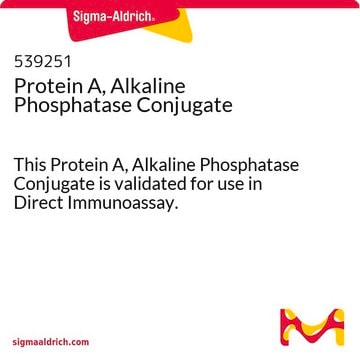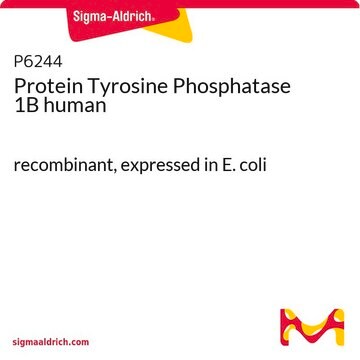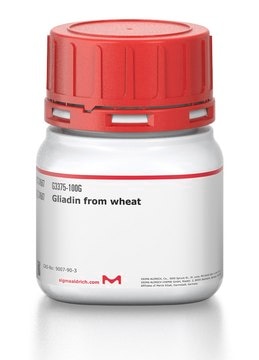P7488
Protein A−Alkaline Phosphatase
protein A from Staphylococcus aureus
Sinónimos:
Protein A−AP
Iniciar sesiónpara Ver la Fijación de precios por contrato y de la organización
About This Item
Productos recomendados
biological source
protein A from Staphylococcus aureus
Quality Level
conjugate
alkaline phosphatase conjugate
color
clear light yellow
storage temp.
2-8°C
General description
Protein A is a 42 kD cell surface protein isolated from Staphylococcus aureus. It exists in secreted as well as membrane associated forms and has high binding affinity for immunoglobulins. So, this property is useful for the labeling and purification of antibodies. Protein A−Alkaline Phosphatase can be used in immunoblotting to analyse the IgG glycosylation. Protein A−Alkaline Phosphatase has specificity for most of the mammals except goat, sheep and rat.
Application
Protein A−alkaline phosphatase may be used in ELISA for analysis of IgG glycosylation.
Physical form
Solution at approx. 1 mg protein/ml in 50 mM Tris, pH 8.0, 1.0 mM magnesium chloride, 0.1 mM ZnCl2, 1% bovine serum albumin, 50% glycerol, and 15 mM sodium azide.
Disclaimer
Unless otherwise stated in our catalog or other company documentation accompanying the product(s), our products are intended for research use only and are not to be used for any other purpose, which includes but is not limited to, unauthorized commercial uses, in vitro diagnostic uses, ex vivo or in vivo therapeutic uses or any type of consumption or application to humans or animals.
Storage Class
10 - Combustible liquids
wgk_germany
WGK 2
flash_point_f
Not applicable
flash_point_c
Not applicable
Certificados de análisis (COA)
Busque Certificados de análisis (COA) introduciendo el número de lote del producto. Los números de lote se encuentran en la etiqueta del producto después de las palabras «Lot» o «Batch»
¿Ya tiene este producto?
Encuentre la documentación para los productos que ha comprado recientemente en la Biblioteca de documentos.
A Croce et al.
Journal of clinical laboratory analysis, 21(5), 303-314 (2007-09-12)
In patients with rheumatoid arthritis (RA) a decrease in the terminal galactose content of N-linked glycans of the Fc region of agalactosyl immunoglobulin G (IgG) (G0) occurs. The aim of this study was to evaluate, for the first time, the
Lisa D MacDonald et al.
Human vaccines & immunotherapeutics, 14(1), 59-66 (2017-09-22)
Peptide antigens are combined with an adjuvant in order to increase immunogenicity in vivo. The immunogenicity and safety of a RSV vaccine formulated in a novel oil-based platform, DepoVax™ (DPX), was compared to an alum formulation. A peptide B cell
B N Ogunro et al.
Journal of epidemiology and global health, 8(3-4), 162-170 (2019-03-14)
Ebola viruses (family: Filoviridae) are the cause of Ebola virus disease (EVD), a highly fatal illness characterised by haemorrhagic fever syndrome in both humans and non-human primates (NHPs). West Africa was the epicentre of the 2013-2015 EVD epidemic which caused
M Graille et al.
Proceedings of the National Academy of Sciences of the United States of America, 97(10), 5399-5404 (2000-05-11)
Staphylococcus aureus produces a virulence factor, protein A (SpA), that contains five homologous Ig-binding domains. The interactions of SpA with the Fab region of membrane-anchored Igs can stimulate a large fraction of B cells, contributing to lymphocyte clonal selection. To
Li Cui et al.
Neurobiology of aging, 30(6), 903-909 (2007-11-03)
Aging was associated with increased oxidation of DNA, RNA, and lipids in the cerebellum of male rats. DNA and lipid oxidation was reduced by lifelong (94 weeks) voluntary exercise on a running wheel. A reduction in cerebellar lipid oxidation, but
Nuestro equipo de científicos tiene experiencia en todas las áreas de investigación: Ciencias de la vida, Ciencia de los materiales, Síntesis química, Cromatografía, Analítica y muchas otras.
Póngase en contacto con el Servicio técnico








